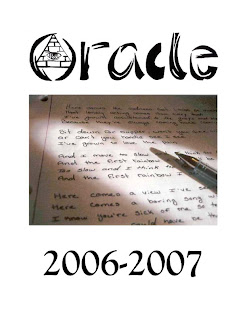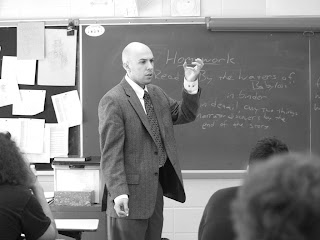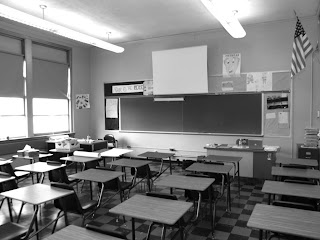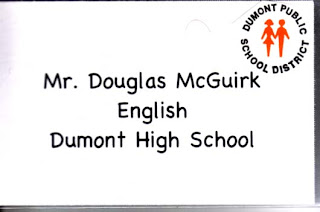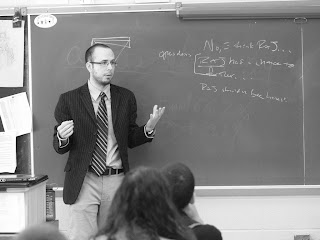 (photo of my brother Ryan teaching)
(photo of my brother Ryan teaching)The most difficult aspect of my first two years of teaching was learning curriculum based material well enough to be able to create meaningful lessons for the students. Just reading and understanding a particular book is not enough to be able to offer an authentic learning experience. Somehow, while reading, I would have to probe into the depths of the book, think about its themes, and try to find some relevance to our modern-day society. When students can connect books to their own lives, they become much more involved in the learning process. Their faces light up with recognition. Needless to say, a class truly has some of its best moments when students are being engaged and challenged. With some books, I was able to create valuable lessons on my first try. With others, I am still searching for a method that will finally reach my level of expectation. In one case, I used outside help to make a lesson that will only improve with time.
At the beginning of May, I decided to teach Kurt Vonnegut’s short story “The Lie” for the first time. The story fits into the “Search of Self” unit of the English 3 CP curriculum. It is a deceptively simple story about a boy who is denied admission to the boarding school that several generations of his family have attended. Of course, there are larger societal implications of nonconformity, settling for mediocrity, rebelling against established laws, and so forth. Trying to plan a lesson for this story seemed daunting and confusing. Fortunately, I had my younger brother, Ryan. Ryan had just completed his senior year of college, writing an Honors Thesis about the role of social machines in Kurt Vonnegut’s writings. I first asked him to help plan the lesson with me, then I asked him if he wanted to teach it with me. He was more than happy to help.
We brainstormed furiously for this class, knowing that we were faced with a difficult lesson objective: we wanted students to understand Vonnegut’s opinions about how we define ourselves. We drew up pages of notes, rejected ideas, tried new ones, thought of ways to link them, and ultimately created an outline that flowed extraordinarily well from activity to lecture to discussion and back again. By the end of the lesson, we surmised, students should be able to understand the lesson objective.
Ryan’s first (and only, to this point) day in the classroom was not the smooth ride I’m sure he envisioned. He learned a lot about the challenges of a high school classroom, which can be so different from a high level college course. But, for the first time, I felt like an experienced teacher, able to help him convey information to the students, and to rephrase difficult questions. Students responded to him, naturally, since he was a different presence and change from me. By the end of the lesson, I felt that we had accomplished our objective. My best evidence that we had achieved our success came when students were able to apply Vonnegut’s ideas to other stories we studied, like Night or Raisin in the Sun. I was so happy with the lesson that we created that I plan to be observed while teaching this lesson, on my own, in the fall. I’m sure it will be revised somewhat, but I plan on using my brother’s ideas to help create a lesson that is refined, creative, engaging, and challenging.
To view a slideshow of our work in creating this lesson, click here.
Written: 8/6/07
